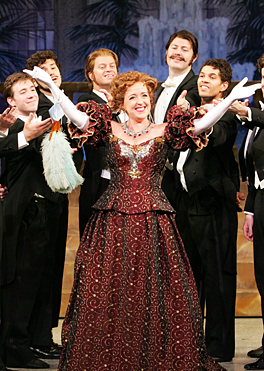
|
|
Vol. LXII, No. 31
|
|
Wednesday, July 30, 2008
|

|
|
Vol. LXII, No. 31
|
|
Wednesday, July 30, 2008
|
 THE MERRY WIDOW: Jennifer Aylmer enjoying herself in the title role of Franz Lehar’s “The Merry Widow.” The Opera New Jersey production opened Friday night at the Berlind Theatre. For ticket information, call (609) 799-7700.
|
Opera New Jersey continued its very busy summer season this past weekend with continued performances of La Traviata and La Cenerentola, as well as opening a third production, Franz Lehar’s The Merry Widow. Friday night’s opening in McCarter’s Berlind Theatre, presented in English with English supertitles, certainly made the most of an operetta that may be just inherently a bit too long and theatrically bogged down at times.
The Merry Widow was a huge success in its original form, with performances worldwide. Opera New Jersey Stage Director Marc Verzatt filled the Berlind stage with people for Friday night’s opening performance, with the exception of a few scenes featuring the two primary couples — Mme. Hannah Glawari and Count Danilo, and Valencienne and Camille de Rosillon.
Opera New Jersey continues its summer season through next week, with continued performances of “La Traviata,” “La Cenerentola” and “The Merry Widow,” as well smaller “scenes” concerts. Ticket information can be obtained by calling Opera New Jersey at (609) 799-7700.
This production focused much of the attention of the first act on the grand entrance of Mme. Glawari, a wealthy widow on whom, in typical operatic plot-stretching, the financial fate of a small nation rested. The first act set (courtesy of Tri-Cities Opera Company) was centered around a grand staircase, worthy of the most luxurious ocean liner, down which soprano Jennifer Aylmer made her entrance, proclaiming her command of the stage. Ms. Aylmer, a veteran of Handel and Mozart as well as operetta, was consistently animated and showed herself to be a solid and experienced singer, with a very clean high register. Ms. Aylmer clearly enjoyed her role in this production, sufficiently milking her character’s signature “Vilja” song and interplaying well with the other characters, including her romantic foil, Count Danilo Danilovitch.
Baritone Brian Jagde, singing the lead male role of Danilo, performed with John Cleese-like animation and a vocal style which belied his “Festival Artist” status. Although it was sometimes hard for Mr. Jagde and Ms. Aylmer to sing pianissimo through the orchestra, these two singers consistently carried their scenes well.
The secondary couple was Frenchman Camille de Rosillon and Valencienne, actually the wife of the Barton. Tenor Benjamin Bunsold was refreshingly youthful and sang the high light role with comedic control to match his partner Valencienne. Soprano Alison Trainer had good control over Valencienne’s flirtatiousness as she maneuvered through the plot’s twists.
There were a host of minor characters, mostly men trying to keep their wives from straying (“What about my husband?” was a very popular line in this opera); most notable were tenor Code Austin and baritone Jason Plourde. Count Danilo’s four femmes-fatales finally arrive in the third act, and director Verzatt cleverly set up Ellen Putney Moore to play her character (Frou-Frou) with more than a slight hangover.
Conductor Steven Mosteller led an orchestra that provided some very sensitive instrumental solos, including from winds and cellist Talia Schiff. Following a lively opening, the orchestra continued to support the singers well, especially given how much dialogue was interspersed in the music. The extraneous male characters came together as a solid male chorus from time to time, well trained by Keith Chambers. Also notable was the great deal of choreography in this production, well crafted by Mary Pat Robertson.
Patricia Hibbert’s costumes for this performance were bathed in pastel colors, which set off well Mme. Glawari’s burgundy and gold formal dress. It was clear that a great deal of thought had gone into costuming this production, and although the stage seemed a bit crowded at times, the overall visual effect was appealing.